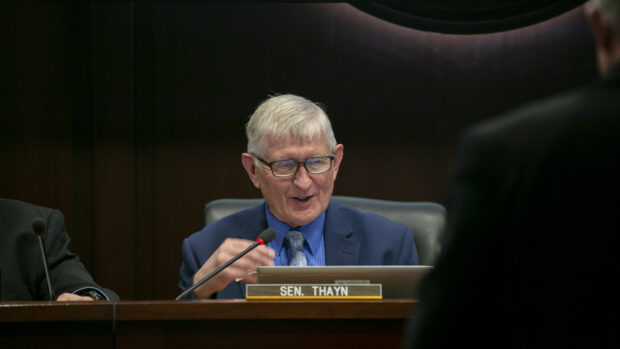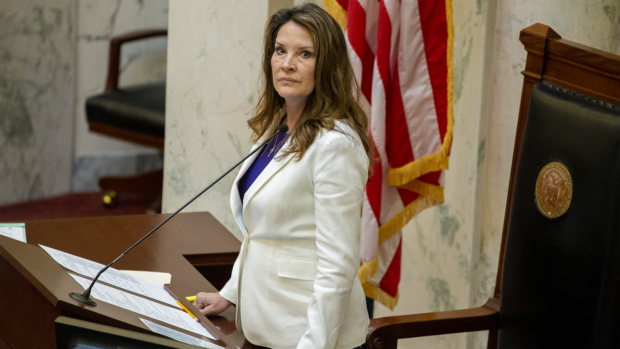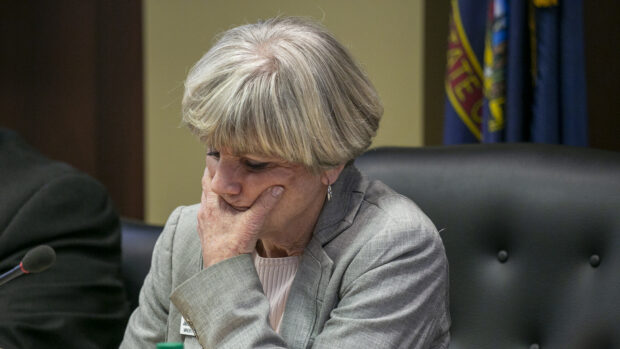Idaho’s all-day kindergarten bill is headed to Gov. Brad Little’s desk.
On Wednesday, the Senate quickly passed a reworked literacy bill, just two days after the House passed it.
House Bill 790 does two things:
- It puts an additional $46.6 million into early reading efforts — on top of the existing $26.1 million literacy budget. School districts can use this added funding for all-day kindergarten, augmenting the money they now receive for half-day classes. But no school is required to offer all-day kindergarten, and no parents are required to enroll a child in all-day kindergarten.
- The bill will require school districts to explain how they plan to spend supplemental property tax levies.
The levy disclosure language was a key selling point with House members — and the purpose of their literacy bill rewrite. House members wanted some assurance that the state’s all-day kindergarten funding would prompt districts to move those programs off the local property tax.
The Senate went along Wednesday — after brief debate, and with some misgivings.
“This seems to be our kindergarten bill, and we’ve pretty successfully erased the word ‘kindergarten’ from this bill,” said Sen. David Nelson, D-Moscow, who voted for the bill despite his misgivings. Nelson said he’s worried the Legislature could yank kindergarten funding in the future, and he said he disagreed with the House’s levy disclosure language.
Sen. Jim Woodward, R-Sagle, said he also was concerned about the disclosure language, but he said he believed it was workable.

The bill’s floor sponsor — Senate Education Committee Chairman Steven Thayn, R-Emmett — focused on the meat of the literacy funding plan, unchanged from the original bill senators had passed two weeks ago. Half of the literacy money would go out to schools based on enrollment; the other half would go out based on how many students score at grade level on the Idaho Reading Indicator, or show improvement on the screening test.
The state now distributes literacy dollars based on the number of students who struggle on the IRI — a formula that Thayn and other lawmakers say rewards failure.
As with the first Senate vote, Wednesday’s outcome was not in doubt. HB 790 passed 31-3, with only Republicans Regina Bayer of Meridian, Kevin Cook of Idaho Falls and Christy Zito of Hammett in opposition.
Wednesday’s vote probably wraps up the Legislature’s work on all-day kindergarten, one of the big education topics of the 2022 session.
It also appears to be an election-year victory for Little, who started the session by proposing $46.6 million in optional all-day kindergarten funding. Once the bill reaches his desk, Little has five days to act on it, not counting Sundays.
McGeachin breaks tie, passes on WWAMI bill
A bill requiring Idaho medical school graduates to practice in the state is also headed to Little’s desk — by the slimmest of margins.

Lt. Gov. Janice McGeachin broke a 17-17 tie Senate vote Wednesday, passing House Bill 718.
The bill would require Idaho students in the state’s medical school cooperatives to sign a contract with the State Board of Education. The students would agree to practice medicine in Idaho for four years after they graduate from the University of Washington or University of Utah medical schools. If they don’t do so, they would be required to pay back the state’s subsidies for their medical education.
Supporters say the bill would alleviate Idaho’s doctor shortage. Opponents say the bill would place an undue burden on medical school graduates who often struggle to find residencies in Idaho.
The state spends about $6.9 million a year on the WWAMI co-op, named for the member states of Washington, Wyoming, Alaska, Montana and Idaho, and housed at the University of Washington. It spends an additional $2.6 million on medical school seats at the University of Utah. The House voted to reup the annual budget funding both partnerships Wednesday without debate, sending the health education budget bill to Little’s desk on a 44-12 vote.
The Senate roll call on HB 718:
Yes: Kelly Anthon, R-Burley; Regina Bayer, R-Meridian; Robert Blair, R-Kendrick; Van Burtenshaw, R-Terreton; Lori Den Hartog, R-Meridian; C. Scott Grow, R-Eagle; Todd Lakey, R-Nampa; Abby Lee, R-Fruitland; Patti Anne Lodge, R-Caldwell; Fred Martin, R-Boise; Jim Rice, R-Caldwell; Doug Ricks, R-Rexburg; Peter Riggs, R-Coeur d’Alene; Steven Thayn, R-Emmett; Julie VanOrden, R-Pingree; Steve Vick, R-Dalton Gardens; Chuck Winder, R-Boise.
No: Jeff Agenbroad, R-Nampa; Grant Burgoyne, D-Boise; Kevin Cook, R-Idaho Falls; Carl Crabtree, R-Grangeville; Jim Guthrie, R-McCammon; Mark Harris, R-Soda Springs; Lee Heider, R-Twin Falls; Dave Lent, R-Idaho Falls; David Nelson, D-Moscow; Mark Nye, D-Pocatello; Jim Patrick, R-Twin Falls; Carrie Semmelroth, D-Boise; Mary Souza, R-Coeur d’Alene; Janie Ward-Engelking, D-Boise; Melissa Wintrow, D-Boise; Jim Woodward, R-Sagle; Christy Zito, R-Hammett.
Absent: Michelle Stennett, D-Ketchum.
Senate quickly passes six K-12 budgets
As lawmakers hope to adjourn the 2022 session this week, the Senate quickly wrapped up several other big pieces of the education puzzle Wednesday.
Senators quickly passed six K-12 budget bills, with little debate. It was a repeat from the House, which overwhelmingly supported the budget bills Monday afternoon.
The bills account for the bulk of a K-12 budget of nearly $2.3 billion in state general fund tax dollars. K-12 spending would increase by 11%, as Little recommended in January.
The budgets included two of Little’s education line items:
- Accelerated teacher pay raises, using a combination of $104 million in state dollars and federal coronavirus aid.
- An upgrade of K-12 employee health benefits, costing $75.5 million in one-time money and $105 million of ongoing funding.

“This is a really good day,” said Sen. Janie Ward-Engelking, a Boise Democrat and retired teacher, as she presented the teacher salary budget bill. “We’re putting our state in a really good position to be able to retain our teachers.”
The teacher salary bill passed unanimously. The other five budgets also passed unanimously or with two or three dissenting votes.
These budget bills now go to Little’s desk.
The seventh and final K-12 budget bill remains on hold. This “children’s programs” budget contains the $46.6 million literacy funding, among other items. It still must pass the House and Senate.
Idaho Education News reporter Blake Jones contributed to this report.
